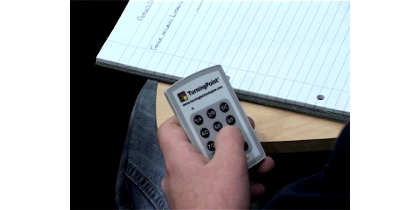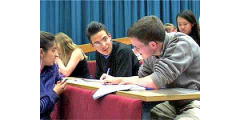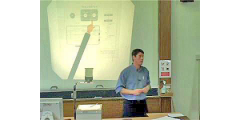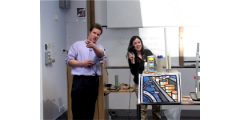Altering lectures in response to student input
February 23, 2008
Video >> Interviewer: “Does the student voting actually affect what you deliver in the lecture?” Andrew: “Yes, yep, it does. I know where I want to go, and how to get there is pretty much mapped out, but I’ll put a different emphasis on things. So if typically I’ll have a thought experiment sort of …
Involving students in large groups: ideas for using interactive handsets
June 26, 2007
Video >> Richard Field, Geography: “With second year students there’s an element of confidence as well about whether they feel very happy discussing research front articles in front of a group and kind of criticising. And there was a lot of listening – not so much talking – done by the students. “So another thing …
Learning from lectures: a dyslexic student’s view
June 18, 2007
Video >> Kate: “Are there any teaching and learning strategies that some of your tutors may adopt that are particularly supportive of your study?” Annie Evans, student, Archaeology: “The thing I’ve found really useful is we have one lecturer who just puts everything on WebCT (now Moodle), like seminar reading lists…absolutely everything, journals…and then its …
Podcasting Maths lectures: how and why?
Video >> Kate: “So I understand that you’ve been experimenting with the use of audio podcasting; tell me how that’s gone.” Joel Feinstein, Mathematical Sciences: “That’s right, yes. The University was kind enough to lend me a professional quality mp3 recorder which I’ve been using to make audio podcasts, audio recordings of all of my …
Questions and activities in lectures
February 21, 2007
Video >> Kate: “Can I ask you about asking the students questions in lectures, why do you do it and what do you think are the benefits?” Ed: “Probably because the attention span of the average person is in the order of minutes. You have got to do anything you can to get them to …
Structure, pace and activities in lectures
Video >> Extract from a lecture Ed: “I just want to do a quick reminder of what we talked about this morning and how things actually get sorted and the basic problems arise, or at least legislation about air pollution has arisen out of a sequence of events over obviously several hundred years as we dealt …
Handouts for learning in lectures
January 31, 2007
Video >> Kate: “In the lecture, you were using a number of different audio-visual and other teaching resources. What do you use and why do you use those particular kinds of resources?” Martin: “Science courses are very content-laden. In some ways that’s a strength but in some ways it’s a problem. There’s often a lot of material …
Demonstrating principles using activities in lectures
Video >> Kate: “The last thing I wanted to ask you about was the demonstrations and bringing that into a classroom. What are the pros and cons of doing something like that, do you think, in terms of for the students and for the lecturer?” Ed: “The con might be that it goes wrong. There …
Classroom management and mobile phones
Video >> Martin Luck: “I think it takes a while to build up an armory of methods for dealing with these situations. How do you deal with a mobile phone when it goes off? How do you deal with late comers? How do you deal with somebody suddenly getting up and going in the middle …
“Please turn on your mobile phones” – ubiquitous computing in the classroom
January 30, 2007
Mette Asmild, Andrew Jackson, Benson Lau and Nick Mount: “The adoption of the mobile telephone has revolutionised social and commercial communication in the 21st Century. Whilst it is estimated that the majority of students in British higher-education (HE) use mobile-‘phones and text/SMS-messaging, the learning benefits of adopting and supporting mobile ‘phone text-messaging communication from students …










